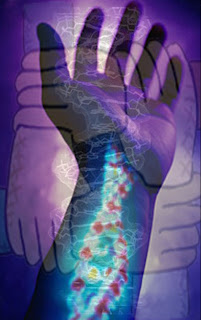skip to main |
skip to sidebar
 The Genographic ProjectJournal Entry # 4The Genographic Project is lead by geneticists stationed all over the world. They each acquire their own field research and do their own analysis. But what helps to make this project above that of others, is that each geneticist helps the others and shares ideas, knowledge and methods of practice. Their are also a number of technological advances that accompany this project. These are such as advances in mining tools and machine speed calculation. This increases the efficiency in which DNA can be collected and the memory and overall ability of their computers.But what makes this project only possible today is our highly mobile, global society.It is because of our transportation abilities that geneticists can travel to all parts of the world and retrieve the research that they need. They would not be able to do this project 100 years ago, 50 years ago, or even 25 years ago. They could try, and probably find some crucial information, but not nearly as much as they would today. Even just 25 years ago they would not have the technology, the resources, or the transportation they would need.The Genographic Project is a five-year study to establish the world's largest collection of DNA samples and to map out how mankind has populated the planet. It is an important project because it will reveal the migratory history of humans and help us to understand the connections, differences, and similarities that make up mankind. It will provide information on how we travelled the world, what kind of impact culture has had on the genetic variation of humans, and why then if we all share a common ancestor, do we all look different? The timing of this project is very important because only now do we have the resources available for such a research project, and there are still groups of people who carry the direct genes of their ancestors.Indigenous groups are extremely important to the project because their genetic identities are isolated. They are not like most other people in the world whose DNA are mixed with people from all around the world. The indigenous group's DNA are easier to read and provides a clear understanding to the genetic signals of mixing populations.
The Genographic ProjectJournal Entry # 4The Genographic Project is lead by geneticists stationed all over the world. They each acquire their own field research and do their own analysis. But what helps to make this project above that of others, is that each geneticist helps the others and shares ideas, knowledge and methods of practice. Their are also a number of technological advances that accompany this project. These are such as advances in mining tools and machine speed calculation. This increases the efficiency in which DNA can be collected and the memory and overall ability of their computers.But what makes this project only possible today is our highly mobile, global society.It is because of our transportation abilities that geneticists can travel to all parts of the world and retrieve the research that they need. They would not be able to do this project 100 years ago, 50 years ago, or even 25 years ago. They could try, and probably find some crucial information, but not nearly as much as they would today. Even just 25 years ago they would not have the technology, the resources, or the transportation they would need.The Genographic Project is a five-year study to establish the world's largest collection of DNA samples and to map out how mankind has populated the planet. It is an important project because it will reveal the migratory history of humans and help us to understand the connections, differences, and similarities that make up mankind. It will provide information on how we travelled the world, what kind of impact culture has had on the genetic variation of humans, and why then if we all share a common ancestor, do we all look different? The timing of this project is very important because only now do we have the resources available for such a research project, and there are still groups of people who carry the direct genes of their ancestors.Indigenous groups are extremely important to the project because their genetic identities are isolated. They are not like most other people in the world whose DNA are mixed with people from all around the world. The indigenous group's DNA are easier to read and provides a clear understanding to the genetic signals of mixing populations.
 Journal Entry # 3Why are video games so popular now? I think it has a lot to do with the improvement of graphics and the types of games that are available to the public. Video games started out with incredibliy bad graphics (at least compared to today's standards), and a very simple story line; either to just get past Donkey Kong and save Peach, or a race around a single looped track to win. However video games may have started, they are nothing compared to what they are now. Designers of video games only continue to outdo themselves when it comes to their games' animation. This is a very important since it is what gamers of all ages tend to look for when considering if they should buy it. If a game looks like garbage with rough edges, bad colouring, and totally unrealistic characters, it is mostly likely not to be bought. Animation is the eye candy to most people, and it usually can get the first game in a series sold, but it is not the initial reason why people buy games. Video games have to be entertaining. A game could have the best graphics in the world, but if it is slow and dull, or has a steep learning curve, people will not buy it. There are many varities of games on the market today, one of the most popular being role playing games (where you take on a character in a story and work your way through the game by most likely beating dungeons). It is the excitment that is created from playing such a game that people are compelled to buy others.Video games are so popular now because not only are the graphics becoming more realistic each day, but the quality and story line have also advanced dramaticly.I do believe that realistic war games desensitive people from the horror of war because they are fun. War video games are exciting and the graphics are scary realistic. Video games appeal to people because when made correctly, can draw in the gamer. It is as if they are actually part of the game. War video games also hold true to this. But because they are just games, there is no real fear. The person controlling the war game cannot get hurt or injured. They can not die or feel any real pain or loss. And it is because of this that their outlook on how war really is, is distorted. War is all about pain, loss, and suffering. It is these things that creates the horror of it. But the gamer does not experience any of this, only excileration. Therefore, how can these video games not desensitive people to war, when they are conditioning them to believe that there is no horror, only fun?Personally, I do not like war video games. I do find them exciting and fun to play, but also disrespectful to those who actually fought in a war. I feel that it minimizes the full impact and effect war had on the soldiers and everyone else, making it seem fun when those who were there would describe it as hell. Video games are exciting and entertaining, but i do think that a lot of them need to rethink the messages they are sending to the players.
Journal Entry # 3Why are video games so popular now? I think it has a lot to do with the improvement of graphics and the types of games that are available to the public. Video games started out with incredibliy bad graphics (at least compared to today's standards), and a very simple story line; either to just get past Donkey Kong and save Peach, or a race around a single looped track to win. However video games may have started, they are nothing compared to what they are now. Designers of video games only continue to outdo themselves when it comes to their games' animation. This is a very important since it is what gamers of all ages tend to look for when considering if they should buy it. If a game looks like garbage with rough edges, bad colouring, and totally unrealistic characters, it is mostly likely not to be bought. Animation is the eye candy to most people, and it usually can get the first game in a series sold, but it is not the initial reason why people buy games. Video games have to be entertaining. A game could have the best graphics in the world, but if it is slow and dull, or has a steep learning curve, people will not buy it. There are many varities of games on the market today, one of the most popular being role playing games (where you take on a character in a story and work your way through the game by most likely beating dungeons). It is the excitment that is created from playing such a game that people are compelled to buy others.Video games are so popular now because not only are the graphics becoming more realistic each day, but the quality and story line have also advanced dramaticly.I do believe that realistic war games desensitive people from the horror of war because they are fun. War video games are exciting and the graphics are scary realistic. Video games appeal to people because when made correctly, can draw in the gamer. It is as if they are actually part of the game. War video games also hold true to this. But because they are just games, there is no real fear. The person controlling the war game cannot get hurt or injured. They can not die or feel any real pain or loss. And it is because of this that their outlook on how war really is, is distorted. War is all about pain, loss, and suffering. It is these things that creates the horror of it. But the gamer does not experience any of this, only excileration. Therefore, how can these video games not desensitive people to war, when they are conditioning them to believe that there is no horror, only fun?Personally, I do not like war video games. I do find them exciting and fun to play, but also disrespectful to those who actually fought in a war. I feel that it minimizes the full impact and effect war had on the soldiers and everyone else, making it seem fun when those who were there would describe it as hell. Video games are exciting and entertaining, but i do think that a lot of them need to rethink the messages they are sending to the players.


